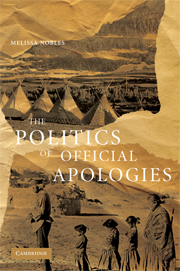Book contents
- Frontmatter
- Contents
- Preface and Acknowledgments
- 1 Toward a Membership Theory of Apologies
- 2 History of National Memberships in Australia, Canada, New Zealand, and the United States
- 3 To Apologize or Not to Apologize: National Histories and Official Apologies
- 4 Beyond Sentiment? Apologies and Their Effects
- 5 The Weight of History and the Value of Apologies
- Appendix: Twentieth- and Twenty-First-Century Public Apologies
- Bibliography
- Index
3 - To Apologize or Not to Apologize: National Histories and Official Apologies
Published online by Cambridge University Press: 24 May 2010
- Frontmatter
- Contents
- Preface and Acknowledgments
- 1 Toward a Membership Theory of Apologies
- 2 History of National Memberships in Australia, Canada, New Zealand, and the United States
- 3 To Apologize or Not to Apologize: National Histories and Official Apologies
- 4 Beyond Sentiment? Apologies and Their Effects
- 5 The Weight of History and the Value of Apologies
- Appendix: Twentieth- and Twenty-First-Century Public Apologies
- Bibliography
- Index
Summary
Canadian political scientist Alan Cairns has described the history recounted in Canada's 1996 Royal Commission of Aboriginal People's Report as “a historical storehouse of mistreatment, deception, arrogance, dispossession, coercion, and abuses of power.” Many scholars, politicians, policy makers, and segments of the public in Australia, New Zealand, and the United States have reached similar conclusions about their national histories and treatment of indigenous people and other minority groups. Government apologies have followed in the wake of official disclosures in certain of our cases, but not all of them. What drives government to apologize or refuse to apologize and what drives groups to demand them? Why are apologies desirable?
This chapter examines state motivations for granting apologies and group motivations for demanding them. It contends that state officials will apologize when they ideologically support and seek to advance minority rights. This is not to suggest, however, that state officials will necessarily initiate the apologies, but rather that they are more likely to apologize when pressured. Aggrieved groups, on the other hand, insist and/or receive apologies, perceiving them as legitimatizing both their claims of historical mistreatment and present-day demands for rectification and self-determination. As state and group actors perceive them, apologies' efficacy in sustaining minority demands derives, in part, from their essential qualities. Apologies perform three tasks, with national histories and their reinterpretations necessarily at their center. First, apologies validate reinterpretations of history by formally acknowledging past actions and judging them unjust.
- Type
- Chapter
- Information
- The Politics of Official Apologies , pp. 71 - 111Publisher: Cambridge University PressPrint publication year: 2008

